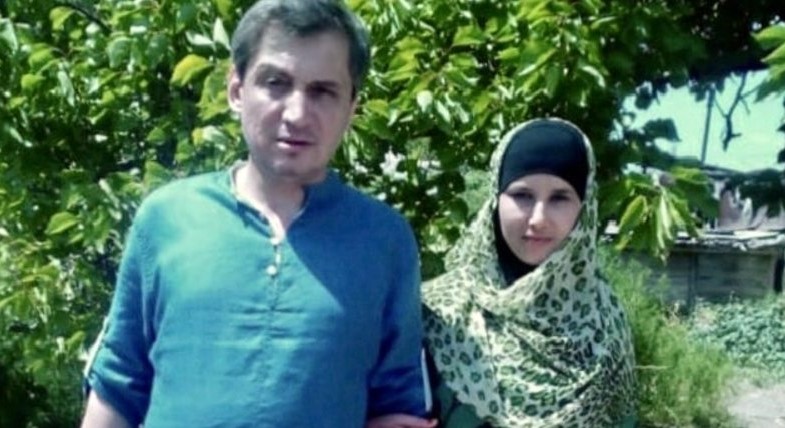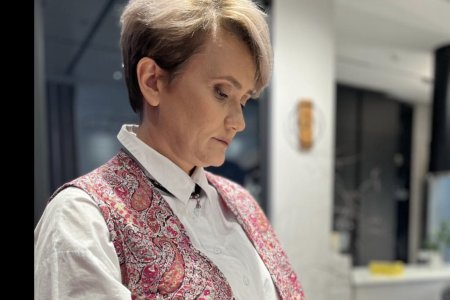
A court in Russia has terminated the ‘trial’ of Nabi Rakhimov in connection with the defendant’s death. The grounds for ending an obvious judicial farce may seem compelling, but they are belated, given that Russia’s FSB killed the Uzbek refugee almost two years ago, and the notorious Southern District Military Court began ‘hearing’ the case back in June 2022. The Russian authorities are still refusing to hand Rakhimov’s body over for burial, with the reason almost certainly because this would confirm that the FSB are lying about how and why they killed Rakhimov, a refugee from Uzbekistan, living peacefully in occupied Crimea with his wife and their two younger children.
It was first claimed that he had ‘shown resistance’ when being detained and that he had therefore been ‘eliminated’, although the version in court appears to have been that he himself detonated an explosive which killed him. The defence insist that he was killed by special force [spetsnaz] officers. Lawyer Edem Semedlyaev reports that he took part in 20 ‘hearings’ before the Southern District Military Court since June 2022
It was over seven months after Rakhimov’s death that the ‘criminal charges’ against the dead man were first announced. By the time the ‘case’ reached the court, there were eight charges, including ‘organization of terrorist activities’ and ‘an attempt on the lives of law enforcement officers’.
The cynicism around these charges is truly shocking. The prosecutor in the case was Igor Nadolinsky, who has been involved in the political trials and horrific sentences against numerous Crimean Tatar and other Ukrainian Muslims. In all those cases, the men have been charged with ‘terrorism’, although the prosecution claims only involvement in the peaceful transnational Muslim organization Hizb ut-Tahrir, which is legal in Ukraine. Russia has illegally imprisoned around 100 Crimean Muslims on these profoundly flawed charges, although there has not once been any evidence of recognizable crimes or plans to commit acts of violence. The prosecution bases such ‘trials’ on the supposed testimony of so-called secret or anonymous witnesses. In all other cases, these secret ‘witnesses’ whose testimony cannot be verified claim only that the men tried to ‘recruit’ them into Hizb ut-Tahrir, held conspiratorial meetings, etc.
Here, however, in the ‘case of Nabi Rakhimov’, who can no longer defend himself, the Russian prosecution has come up, not only with the claim about involvement in Hizb ut-Tahrir; possession of ‘illegal literature’ and ‘recruitment’ of new members, but also with the charge of having bought a gun and explosives to use on public transport. The charges, at least of ‘recruitment’, were also based on the testimony of two ‘secret witnesses’, referred to by the pseudonyms ‘Osmanov’ and ‘Khalilov’.
In no case, has the prosecution ever provided grounds why ‘witnesses’ could fear for their safety if they gave testimony openly, yet Russian or Russian-controlled ‘judges’ invariably allow such ‘testimony’ and even let the alleged witness’ voice be distorted. Such permission in this case is especially cynical since Rakhimov himself is not alive and his widow has been illegally held in a centre for illegal migrants ever since the day the Russian FSB killed her husband.
During the ‘hearing’ on 21 February 2023, the FSB read out a letter claiming that ‘Osmanov’ could not give testimony as he had been mobilized for what the FSB followed the Kremlin in calling Russia’s ‘special military operation’ (its invasion of Ukraine). Although there were legitimate grounds for objecting to this alleged witness’ ‘written testimony being read out, since ‘Osmanov’ was not there to be questioned, the prosecution applied to read this out, and the court allowed it.
The prosecution also claimed that there were three ‘victims’ in this case – three FSB spetsnaz officers, though gave two conflicting reasons for why they were not giving testimony in court. It is particularly irregular that they should be allowed to not testify as they are the three officers who entered the building which Rakhimov was working on. It is their assertion that he tried to show resistance and then used an explosive.
The prosecution also produced some text messages, supposedly either sent to Rakhimov or sent by him to an ‘unidentified person’. In these messages which could, effectively, have been written by anybody, with that including the FSB, Rakhimov is supposed to have said he was planning to blow something up.
During the final hearing, Nadolinsky claimed that Rakhimov’s ‘guilt’ had been proven, but asked for the case to terminated due to the defendant’s death. It was this application that ‘judge’ Maxim Nikitin allowed.
Rakhimov’s widow Sokhiba Burkhanova, and the defence, had not agreed with terminating the case at the beginning, and are unhappy with the court’s decision on 21 May. They were demanding a proper investigation into the charges and for Rakhimov’s acquittal since there had been no elements of a crime in his actions. His widow is convinced that Rakhimov was killed by the FSB and that the entire story about his having supposedly shot at the FSB and then detonated an explosive is to try to justify the FSB’s actions.
Russia’s appalling treatment of Nabi Rakhimov did not end with his death at FSB hands on 11 May 2021, nor did it begin then. Rakhimov was detained in Russia in 2013, with the intention being to deport him to Uzbekistan where he faced religious persecution for his alleged involvement in Hizb ut-Tahrir. He turned for help to human rights lawyers who helped him apply to ECHR over both his treatment in detention and denial of effective judicial review, and over the plans to forcibly return him to Uzbekistan where he faced torture and long imprisonment in connection with his faith. The ECHR judgement in the Case of Rakhimov v. Russia became final in December 2014. The Court ruled that Russia had violated Rakhimov’s rights, prohibited his extradition to Uzbekistan and awarded a considerable amount in damages (9 thousand euros in moral compensation and 8 thousand for expenses).
Russia chose to carry out its ‘operation’ against Rakhimov and his family on 11 May 2021 as the Holy Month of Ramadan was drawing to an end. The family had been living in occupied Crimea for some time, and Rakhimov was supporting them by doing up a new building in a neighbouring village.
At around 6 a.m., armed officers burst into the house where Burkhanova was living, together with the couple’s two underage children - 15-year-old Takiuddin and his 11-year-old sister, Mariam. They do not appear to have produced any warrant, and illegally refused (as always) to allow the lawyers who swiftly arrived to be present. Burkhanova was taken away, first to the migration service, then for questioning, with Takiuddin insisting on going with her.
It is certainly tragic that Rakhimov was alone that morning in the half-finished home that he was both living in and working on, but probably no accident. There had reportedly been signs of surveillance and it seems very likely that the FSB knew that there would be nobody else there.
There are no credible grounds for believing that Rakhimov was armed, and nobody in their right mind would have attempted, as claimed, ‘a shoot-out’ against the three spetsnaz officers who entered the house and the considerable number of other officers outside. Rakhimov had no reason to believe that he was facing criminal prosecution and would have understood that the only grounds for arresting him would be charges of involvement in Hizb ut-Tahrir.
Had Rakhimov really died of gunshot wounds, or a single grenade, as claimed, there would be no reason for the secrecy and refusal to allow the religious burial of a man, against whom any criminal proceedings appear to have been initiated posthumously.
Sokhiba Burkhanova learned that her husband was dead only when an officer pushed a photo in front of her and her son, and demanded that she recognize the man they had killed. A Russian-controlled ‘court’ then ordered her detention in a migrant unit in Krasnodar (Russia), pending forced deportation to Uzbekistan. On 27 May, the European Court of Human Rights applied Rule 39, preventing Russia from forcibly sending Burkhanova to Uzbekistan where she too would face persecution. Russia has not deported her, but is refusing to release her from custody.



